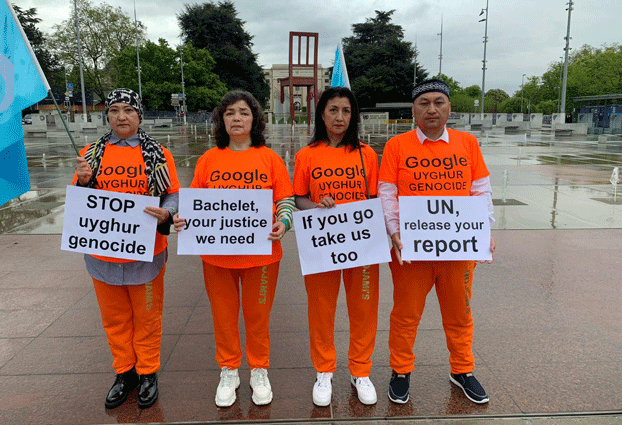Uyghur survivors of China’s internment camps began a weeklong rally outside the United Nations compound in Geneva on Monday, seeking a meeting with the U.N. human rights chief and urging her to issue an overdue report detailing rights abuses in Xinjiang.
Qelbinur Sidiq, Gulbahar Jelilova, Gulbahar Haitiwaji and Omir Bekali have requested a meeting with Michelle Bachelet, the U.N. high commissioner for human rights. She announced last month that she had reached agreement with the Chinese government for a visit in May, including the turbulent western China region.
The Uyghurs want Bachelet to release the human rights report before she visits China. They offered to accompany the former Chilean president on the trip.
“I’d be happy to take them to the camps and prisons in Urumqi,” Gulbahar Jelilova said, referring to Xinjiang’s capital. “If we don’t accompany them, China will play a lot of games not to show them the reality. That’s why we’re requesting to go on this trip.”
Gulbahar Jelilova said she could show the U.N. team a location where Uyghurs were executed and a hospital that removed organs from dead prisoners.
Jelilova said she was detained on accusations of “aiding terrorism” while on a business trip to Urumqi and put into three different camps over a period of 15 months beginning in May 2017.
She returned to Kazakhstan in September 2018, as a direct result of appeals from her two children in Kazakhstan, who sought diplomatic assistance from the Kazakh government.
Jelilova has since alleged since that she witnessed a number of atrocities inside the camps, including the torture and the deaths of innocent people.
Bachelet’s office has been under pressure from rights activists to issue an overdue report on rights violations by Chinese authorities targeting Uyghurs and other Turkic communities in the Xinjiang Uyghur Autonomous Region (XUAR).
Up to 1.8 million Uyghurs and others have been held in a vast network of internment camps operated by the Chinese government under the pretext of preventing religious extremism and terrorism among the mostly Muslim groups.
“We hope she discloses the truth to the world after her return,” said Qelbinur Sidiq, 52, who is also known as Kalbinur Sidik.
The Xinjiang regional government has published statements discrediting Sidiq and other former Uyghur female detainees, who have testified about the abuse they endured or witnessed in internment camps in Xinjiang.
“We’re all fully aware that China is a very crafty and deceptive country extremely skillful at choreographing fake people and fake stages,” said Gulbahar Haitiwaji.
“What worries me most is that it’s really not useful but damaging if Michelle Bachelet does not see the real genocide and real repression, but only meets with the people and fake stages set up by China,” she told RFA.
Haitiwaji was arrested in January 2017, around the time authorities began to detain Uyghurs and other Muslim minorities en masse, accusing them of “religious extremism” and other allegedly phony charges.
She later wrote about her brutal living conditions in prison after she was released and returned to her family France in August 2019.
“If she fails to see the real genocide and real repression in our homeland but report something not truthful, then Michelle Bachelet will become complicit with China’s genocide against Uyghurs,” Haitiwaji said.
A ‘first solid step’
Omir Bekali, a Uyghur of Kazakh decent who said he was tortured by authorities during the nine months he spent in three camps on allegations of terrorist activities, said the demonstration outside U.N. headquarters was “one of the first solid steps we have taken to end the ongoing genocide of our people and to free them sooner.”
“We decided to launch this campaign with the hope of getting more attention from international institutions and media,” he said. “We’re hoping to expand it later to include the European Union. We also hope that camp survivors in the U.S. hold the same rally in front of the U.N. [in New York].”
The United States government and the parliaments of some Western nations have declared that the Chinese government’s abuses in Xinjiang constitute genocide and crimes against humanity.
Monday’s action comes on the heels of tweet by U.S. Ambassador to the United Nations Linda Thomas-Greenfield on April 20 that Bachelet to release the report on Xinjiang, which the human rights chief previously said would be finished in September 2021.
Bachelet first announced that her office sought an unfettered access to Xinjiang in September 2018, shortly after she stepped into her current role. But the trip has been delayed over questions about her freedom of movement through the region.
International rights groups have said that Bachelet’s visit to Xinjiang must be independent and unhindered to be credible.
Also on Monday, the United States Commission on International Religious Freedom (USCIRF) released its annual report, recommending that 15 countries, including China, Myanmar, North Korea and Vietnam, be designated by the State Department as “countries of particular concern” because their governments engage in or tolerate “systematic, ongoing and egregious violations” of religious freedom.
The commission is an independent, bipartisan federal government entity created in 1998 to monitor and report on religious freedom abroad and make recommendation to the U.S. administration and Congress.
The report noted that the U.S. government had implemented USCIRF recommendations, including the use of targeted sanctions on religious freedom violators and genocide determinations for atrocities perpetrated by the Chinese government against Uyghur and other Turkic Muslims.
“Throughout the past year, the U.S. government continued to condemn abuses of religious freedom and hold perpetrators accountable through targeted sanctions and other tools at its disposal,” said USCIRF vice chair Nury Turkel in a statement. “Moving forward, the United States should take additional steps to support freedom of religion or belief around the world. USCIRF’s 2022 Annual Report makes recommendations on how Congress and the Executive Branch can further advance this universal, fundamental human right.”

